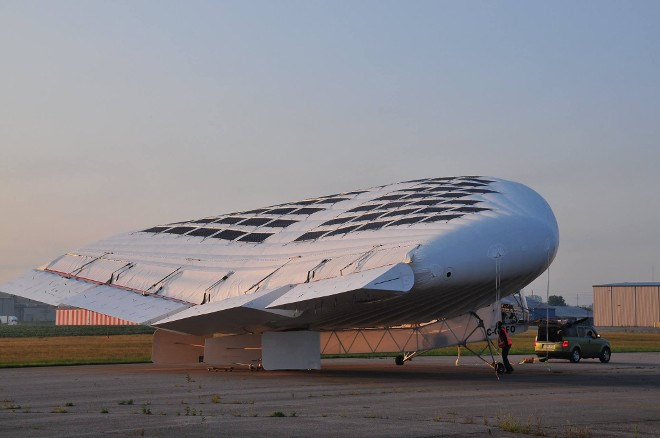The founder and chief executive of a solar-powered hybrid aircraft manufacturing firm is looking to make a big landing in Northern Ontario next year.
And Thunder Bay may serve as its regional base to connect remote communities to the rest of the world.
Frustrated by past unsuccessful attempts to break through in Canada’s Far North, Jay Godsall of Solar Ship is using Africa as a launching pad and a proving ground for his disruptive brand of aviation technology that, he hopes, will speak volumes for what they provide at home.
“Our favourite place in the world would be Northern Ontario to start, by far,” said Godsall, which he describes as “900,000 square kilometres of opportunity.”
On its website, the Toronto and Brantford-based manufacturer has announced ambitious plans to launch into Canada’s North in 2017.
Of all the regional economies to work in, Godsall said, “Northern Ontario is by far the most robust and busiest.”
But Africa offers an immediate opportunity and the space to make a life-changing difference in a large market.
Solar Ship has been billing their aircraft as the latest iteration of the Canadian bush plane that’s cheaper than chartering a Hercules and is capable of carrying more payload that a Twin Otter.
At its assembly hangar at the Brantford airport, the 50-employee firm has three models of aircraft in various stages of development, of which two models will be deployed shortly in Africa for disaster relief.
Solar Ship aircraft have a bush plane-like fuselage with a helium-filled extended overhead wing that’s flattened out to accommodate solar panels.
It has both a combustion engine plus an electric motor to run off solar energy.
Though it resembles an airship, Godsall prefers to distance the company from that category.
“We’re registered (with Transport Canada) as a bush plane. We use the buoyancy to make us lighter on our wheels, which makes us fatter and slower, but we are definitely a bush plane, not an airship.”
The company made headlines in September with an agreement to sell four aircraft to Manaf Freighters, a Burundi air cargo carrier, that willl deliver food, clothing, medical supplies and basic amenities to isolated communities in East and Central Africa through their Peace & Freedom Services joint venture.
Two of Solar Ship’s nimble Caracal aircraft – which can take off and land in a soccer field – and two of its larger Wolverines – capable of carrying a 20-foot shipping container – are expected to be deployed in early 2017.
The ability to deliver intermodal container freight to isolated communities becomes a literal and figurative building block, said Godsall, who has been cultivating business ties in Africa since 2010.
“The red blood cell of the remote economy is the shipping container.”
But transporting into scary places, like the Congo, means establishing trust with multi-generational private networks that dominate how business is done on the continent.
Since governments are unpredictable, Godsall said “the key to everything in Africa is networks.”
The relief operations they’ll establish in Africa, the aircraft hours they’ll log, and freight metrics they’ll produce should build a case to bring relief services to the North.
Financing through the R & D stage has come from private investors, government funding and Kuang-Chi, a Shenzhen, China-based technology conglomerate, a market where Solar Ship is creating a transportation network into the remote parts of that country in 2017 as well.
Since starting Solar Ship in 2006, Godsall’s built a company culture that can function with military-like efficiency in some of the harshest climates and most dangerous places in the world.
They’ve recruited a former air force engineer, a commander, and retired fighter jock as their lead test pilot.
Their aircraft testing and evaluation has been under the intense scrutiny of the Royal Canadian Air Force through the Build in Canada Innovation Program, with oversight from Transport Canada.
“From an entrepreneurial point of view, it is a total pain in the ass,” admits Godsall.
But having that third-party validation demonstrates to the global market that Solar Ship is more than just a floating pipe dream.
Their aircraft have been tested in minus 33 C weather, can handle 30-kilometre-an-hour winds, and is controllable in crosswind situations, a big factor that Godsall said separates them from competitors in the hybrid-airship sphere.
The earliest Northerners can take a gander at Godsall’s flying machine is next summer when the company is planning a promotional tour with a flight from Brantford to Yellowknife.
They will be some Northern Ontario pit-stops to showcase the aircraft and celebrate their network affiliates.
“My wife is from Thunder Bay,” said Godsall. “I’ll be shot and rolled into a snowbank if I don’t go through Thunder Bay.”
Though he’s reluctant to discuss what partnerships are lined up, the company is working to establish a Thunder Bay presence, confirmed Solar Ship spokeswoman Margaret Milde in an email.
“We have been working in Thunder Bay for a long time and, yes, we have plans to build a hangar in Thunder Bay,” she said. “The financing on this is still in negotiations, so we are not commenting on the project right now.”
In years past, Godsall crafted a number of First Nation community and business proposals – including one with Wasaya Airways – but their plans were scuttled “27 times” by the federal government.
Undeterred, he’s inviting Northern business leaders and aspiring First Nation entrepreneurs to join them in Africa, hoping they’ll be inspired to apply the lessons learned over there to their home communities.
“We’ve got kids from the North working at our shop in Brantford. They’re phenomenal.”




